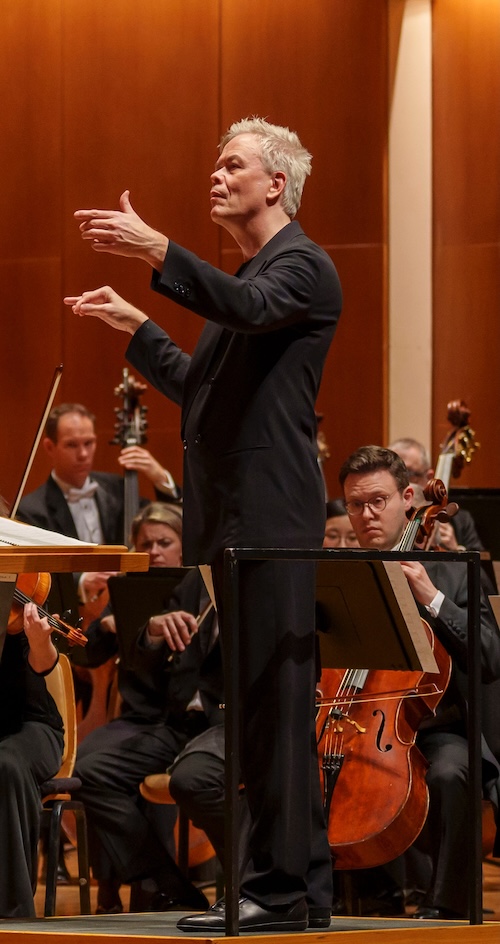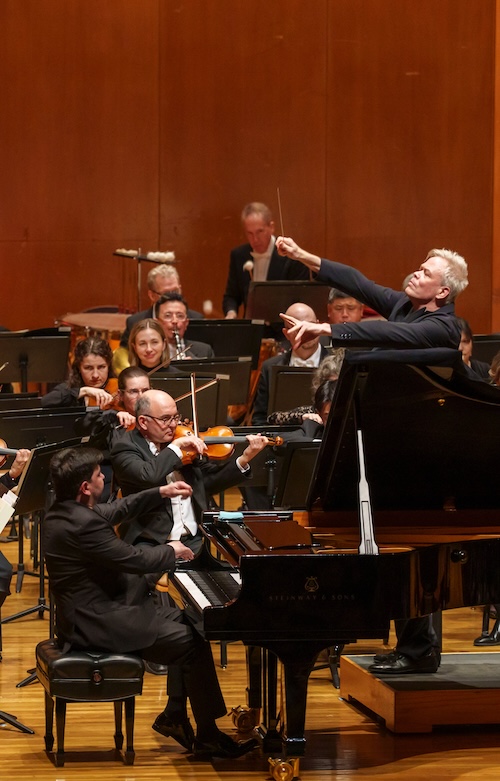Lintu returns to CSO with iridescent Saariaho and satiric Shostakovich

The two main works on this week’s Chicago Symphony Orchestra program pair a once-inescapable concerto that has lost favor with a formerly unsung symphony that has gained popularity.
The outlier in the otherwise Russian program, conducted by Hannu Lintu Friday night at Symphony Center, was Ciel d’hiver (Winter Sky) by Kaija Saariaho, the prolific and individual Finnish composer who passed away last June at age 70.
Ciel d’hiver is a 2013 arrangement of the middle movement of Saariaho’s quasi-symphony Orion (2002), her largest work for orchestra. This revamped version is wholly characteristic, scored for expansive forces but using the instruments with great subtlety and an acutely refined color palette. There is an austere, elemental power in Saariaho’s music that descends from her compatriot Sibelius but her own original voice comes through. The hushed rustling of high percussion frames the score, with avian solos for piccolo and violin, and wail-like outbursts at the halfway mark. Saariaho’s brand of dark luminosity, with its crystalline hues and flowing solemnity, is compelling throughout the ten-minute span of Ciel d’hiver. Lintu led an atmospheric, adroitly balanced performance that deserved better than the tepid applause it received.
While hardly neglected, Tchaikovsky’s Piano Concerto No. 1 in B flat minor isn’t as omnipresent a concert-hall staple as it was for most of the 20th century, ceding ground to concertos by Rachmaninoff, Brahms, Ravel and others. (The last CSO subscription outing was in 2018.)
Fresh from a Carnegie Hall recital last month, Behzod Abduraimov showed himself well equipped to tackle the demands of Tchaikovsky’s warhorse in his CSO debut. The Uzbekistan-born pianist clearly possesses the requisite muscle and stainless-steel technique. The broad opening chords set the tone for his performance, centered on power and faultless fingerwork with nary a dropped note throughout. The frenetic final movement was undeniably exciting with the soloist’s virtuosity on display in his blazing runs up and down the keyboard.

But anyone looking for lyric charm and some of the subtler aspects of this score was apt to be disappointed. For all the bravura, this was a loud, aggressive and relentless performance, the score sounding more like the best Tchaikovsky concerto Prokofiev ever wrote.
The soloist found little allure in the music, hardly ever exploring quieter dynamics or relaxing enough to let the lyrical episodes of the first movement breathe. The Andantino brought some respite and gentler playing but not enough to quell the tense, overdriven style of the overall performance.
Lintu’s souped-up accompaniment was cut from the same cloth with hard-edged tuttis and deafening brass attacks that assaulted the ears. Yevgeny Faniuk’s tender flute playing provided a fleeting oasis of balm amid the cacophony.
Of course, Abduraimov’s volume and velocity elicited a thunderous ovation and multiple curtain calls. The pianist’s playful encore of the “Neapolitan Song” from Tchaikovsky’s Children’s Album displayed a light touch sorely lacking in the concerto.
The Prelude to Mussorgsky’s opera Khovanshchina made an effective segue to the Shostakovich symphony that concluded the evening. Heard here in the latter’s arrangement rather than Rimsky-Korsakov’s more opulent version, Lintu led a clean-cut reading stronger on focus than atmosphere.
Dmitri Shostakovich fell afoul of the Soviet cultural commissars for the second time on the occasion of the premiere of his Ninth Symphony in late 1945. The composer had teased that it would be a celebratory work to mark the end of the Great Patriotic War with soloist and chorus in a paean to the Revolution. What they got instead was a jokey, sardonic 25-minute work.
It may be impossible for any performance of Shostakovich’s Ninth to make it into something greater than the sum of its disparate, predominately lightweight parts. Yet while it may not be among the composer’s most profound inspirations, the symphony’s antic subversiveness seems somehow apt for our times.
Lintu led a concentrated performance that managed to bring cohesion to the five short movements. With its spirit echoing Prokofiev’s “Classical” symphony, the opening Allegro was pure musical burlesque enhanced by cheeky piccolo solos from Jennifer Gunn, later characterfully reprised by concertmaster Robert Chen. The motoric Presto and galumphing finale went with crackling verve and high spirits.
Yet Lintu ensured that the darker shadows of the work made an impact. In the Moderato, flutist Stefán Ragnar Höskuldsson conveyed the mordant brooding of the music. That unease was less manifest in the plain-spun clarinet solos; the absent Stephen Williamson was missed.
It isn’t often that an orchestral bassoonist winds up dominating a performance but such was the case Friday night. Following the ominous brass opening of the Largo, Keith Buncke’s searching, eloquent, beautifully played solo conveyed the stark essence of the man-in-the-wilderness desolation. Buncke’s playing brought a weight and humanity that elevated the entire work and resonated long after the finale’s bumptious high-jinx had faded.
The program will be repeated 7:30 p.m. Saturday and Tuesday. cso.org
Posted in Performances



Posted Feb 25, 2024 at 6:07 pm by Edward Applebaum
I could not disagree more about Abduraimov’s performance. I have heard this piano concerto performed in concert so many times that I anticipated Saturday night’s performance expecting to be a little bored.
Was I ever wrong! I heard the best rendition of this work that I have ever heard. His technical brilliance was matched by a fine sense of musicality in his rendition. For an encore Abduraimov chose a transcription of Paganini’s La Campanella and performed it breathtakingly with a fluidity and sensitivity that any violin virtuoso would admire.
Posted Feb 25, 2024 at 8:04 pm by Lawrence A. Johnson
Different night, different performance. Sometimes adjustments are made.
Posted Feb 27, 2024 at 8:48 pm by Henry and Ellen Criz
We heard this concert Tuesday. Yes, different night, different performance. We felt that, while he could have let that big piano do the work, he was a lot more musical than the last pianist we heard, and his technique was admirable. Not sure about the encore (definitely not La Campanella), but it was something truncated and fun.
Posted Feb 29, 2024 at 2:14 am by David Granato
Like Mr. Applebaum’s comment, I could not disagree more with the initial review of the piano concerto by Mr. Johnson. I, as have many others, heard the Tschaik pc1 numerous times, both in person and on record and approach performances with thoughts of ennui. On Tuesday, February 27, I, like many others, became riveted to our seats by a young man who played with appropriate leonine power, technically flawless, tenderly, sometimes affectionately, with color and grace.
As far as I was concerned he hit the mark on all fronts, and this was one of (if not THE) best live performances I have ever heard. I did not find it loud, aggressive or relentless in any manner. The encore on Tuesday evening was indeed Tchaikovsky’s Neapolitan Song from Children’s Album.And I’m sorry, I cannot believe that his performance changed that much from Saturday til Tuesday.